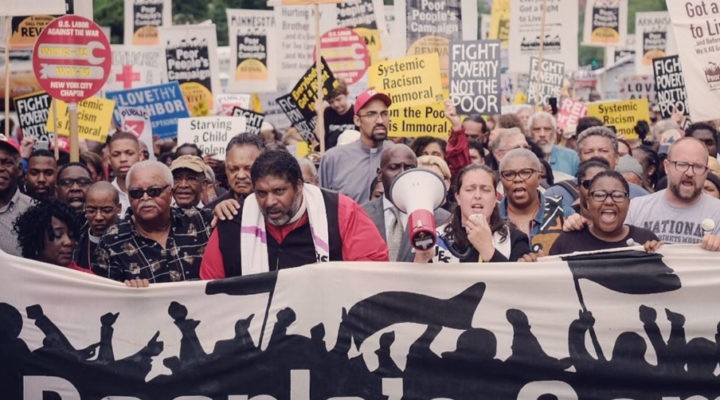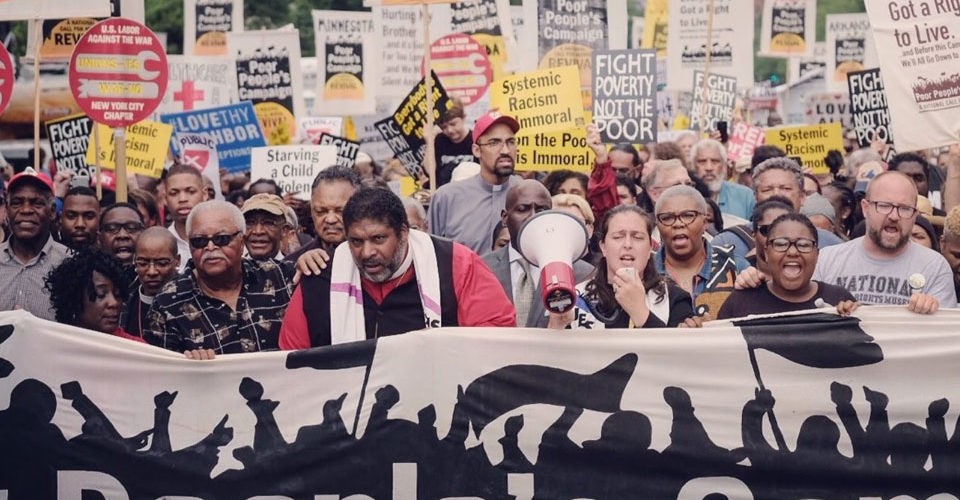The Poor People’s Campaign and its high-profile and charismatic leader, Bishop William J. Barber II, will lead a “Selma-to-Montgomery style” march in Texas this month to protest Republican-led efforts to limit voting rights in the state and around the nation.
Organizers emphasize that the Civil Rights-era symbolism and the nonviolent approach to the July 28-30 trek from Georgetown to Austin are designed to expose the interconnections of voter suppression efforts with federal and state policies that promote poverty and other social and racial injustices, Barber said during a July 21 news conference.
“The march is to say very clearly, as Selma to Montgomery said in ’65, we must have federal action and we are calling on the United States Senate and the president to act by Aug. 6, the anniversary of the signing of the Voting Rights Act, and we demand that Congress act now to stop the attacks on democracy,” Barber said.
“We are calling on the United States Senate and the president to act by Aug. 6, the anniversary of the signing of the Voting Rights Act.”
Among its demands, the campaign and its allies are calling for passage of the John Lewis Voting Rights Advancement Act, which would fully restore the Voting Rights Act of 1965, and the For the People Act, which contains sweeping democratic reforms that would override new and more restrictive state voting laws. The legislation named after the late Georgia U.S. Rep. John Lewis already has passed the House.
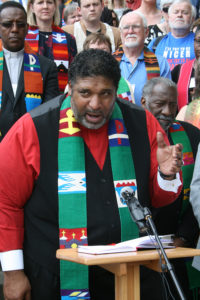
William Barber III
But environmental, immigration and wage reforms also factor into an ongoing series of events in other states, with the Texas march tying them together, Barber added.
“This gathering is to connect the dots. The purpose is to say that the same forces of regression that seek to suppress the vote in Texas and all over the country, and especially in the South, those same forces are opposing passing $15-an-hour minimum wage, addressing poverty, suppressing health care, suppressing climate issues, suppressing just immigration reform and suppressing utility needs.”
Barber said Texas was selected as the site for the march because it “is like the canary in the mine” when it comes to issues of voter suppression and economic, social and racial injustice.
The timing also was influenced by Republican-backed voting measures stalled in the Texas House when 51 Democrats skipped the scheduled vote on July 12, preventing the needed quorum. The bill passed in the Senate the following day.
That was the last straw for state members of the campaign, said Stephanie Swanson, co-chair of the Texas Poor People’s Campaign.
“We reached out to national because we are overwhelmed,” Swanson said, citing voter suppression efforts, the mistreatment of migrants, opposition to a living wage and attempts to deny access to Medicaid, among other concerns.
“There is only so much we can take, and it’s time for us to stand up together.”
“There is only so much we can take, and it’s time for us to stand up together,” she said.
It was then that Barber and other national Poor People’s Campaign officials visited the Lone Star state to meet with the organization’s state leaders to plan the “Moral March” in Texas.
The event they designed includes a prayer vigil in Georgetown July 27, the night before marchers begin their journey to Austin in four-hour daily increments.
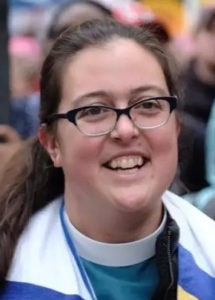
Liz Theoharis
A protest at the Texas statehouse will be held July 31. It will include a procession of casket-bearing vehicles, including hearses, symbolizing the fatal threat to democratic freedoms, campaign co-chair Liz Theoharis said.
Congress will be called out for moral obstructionism, and demands will be made for an end to the filibustering used to obstruct democratic reforms, a $15-an-hour minimum wage and the restoration of the Deferred Action for Childhood Arrivals program, which recently was stopped by a federal judge in Texas.
Theoharis quoted Isaiah 10 — “Woe to those who make unjust laws, to those who issue oppressive decrees, to deprive the poor of their rights and withhold justice from the oppressed of my people” — in condemning voter suppression measures and the Texas Senate’s passage of a bill removing mandates that civil rights history be included in school curriculums.
“We are all too aware that the extremist politicians who are stealing our ability to vote are the same politicians denying living wages, refusing to expand health care, exploiting immigrants and LGBTQ people and women, and so we are marching,” she said.
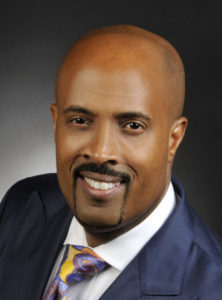
Frederick Haynes
Frederick Douglass Haynes III, senior pastor of Friendship-West Baptist Church in Dallas, identified himself as a member of a “coalition of conscience” and a “moral army” that is supporting the campaign and its upcoming march.
Those supporters are “determined to fight neo-fascism and the war on truth that has been declared by the ideological relatives of the seditionists who tried to overthrow the results of a democratic election on Jan. 6,” said Haynes, who also serves as social justice co-chair with the Progressive National Baptist Convention.
Americans must grasp the relationship between the attempted insurrection and various state attempts to limit voting rights, he said. “We cannot be appalled by the violent attempt to cancel the last election based on a lie and not be against the betrayal of democracy that is seen in voter- and truth-suppression efforts.”
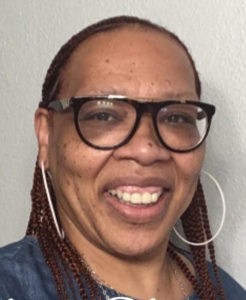
Stephanie Wilkins
Stephanie Wilkins, a minister and member of the Texas Poor People’s Campaign, said far too many Texans live in food deserts and are unable to find jobs that pay a living wage, while some cannot find work at all. The pandemic took an inordinate toll on the unemployed or underemployed and on the homeless.
The purpose of the march, then, is clear, Wilkins said. “We are saying we must be given what we are due. We have a right to live. We have a right to adequate health care. We have a right to the $15 minimum age. Stop trying to suppress our voting rights.”
Former Texas Congressman and Democratic presidential hopeful Beto O’Rourke thanked Barber for making Texas the current focus of his group’s justice efforts. O’Rourke said he agrees with the importance of connecting the dots between attacks on democracy and issues like poverty, pollution and health care.
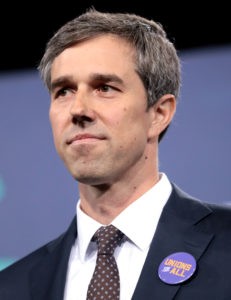
Beto O’Rourke
“This is the epicenter in the fight for the right to vote,” he said of Texas. “We have the toughest voting election laws in the country, bar none. It is harder to vote in Texas than it is in any other state. That is connected to the fact that our minimum wage in Texas is $7.25. It’s connected to the fact that we are the least-insured state in the country. And it’s connected to the fact that we are on the front lines of climate change.”
The challenges are clear, Barber responded. “People make policies to hurt the poor, then they want to block the poor from voting because they know the poor would not stand it.”
But he also predicts victory in the struggle to protect democracy as long as the strategy stays on point.
“This is not just Jim Crow, this is James Crow, Esq., and we need to be talking about the full breadth of people who will be hurt by what’s being done now,” Barber said. “And if we do this — if we make this a moral, constitutional issue — we can in fact win.”
Related articles:
Three reasons 2021 looks like 1961 in voter suppression | Opinion by Bill Leonard
Critical Race Theory, voter suppression and historical negation: The irony of it all | Opinion by Bill Leonard
A vote is ‘a kind of prayer,’ Warnock says in first Senate speech

